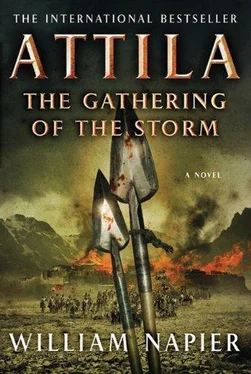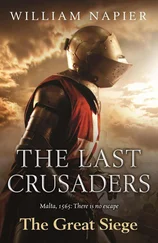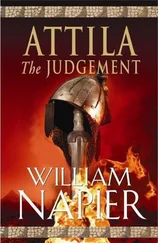William Napier - The Gathering of the Storm
Здесь есть возможность читать онлайн «William Napier - The Gathering of the Storm» весь текст электронной книги совершенно бесплатно (целиком полную версию без сокращений). В некоторых случаях можно слушать аудио, скачать через торрент в формате fb2 и присутствует краткое содержание. Жанр: Исторические приключения, на английском языке. Описание произведения, (предисловие) а так же отзывы посетителей доступны на портале библиотеки ЛибКат.
- Название:The Gathering of the Storm
- Автор:
- Жанр:
- Год:неизвестен
- ISBN:нет данных
- Рейтинг книги:3 / 5. Голосов: 1
-
Избранное:Добавить в избранное
- Отзывы:
-
Ваша оценка:
- 60
- 1
- 2
- 3
- 4
- 5
The Gathering of the Storm: краткое содержание, описание и аннотация
Предлагаем к чтению аннотацию, описание, краткое содержание или предисловие (зависит от того, что написал сам автор книги «The Gathering of the Storm»). Если вы не нашли необходимую информацию о книге — напишите в комментариях, мы постараемся отыскать её.
The Gathering of the Storm — читать онлайн бесплатно полную книгу (весь текст) целиком
Ниже представлен текст книги, разбитый по страницам. Система сохранения места последней прочитанной страницы, позволяет с удобством читать онлайн бесплатно книгу «The Gathering of the Storm», без необходимости каждый раз заново искать на чём Вы остановились. Поставьте закладку, и сможете в любой момент перейти на страницу, на которой закончили чтение.
Интервал:
Закладка:
The Gathering of the Storm
William Napier
LIST OF PRINCIPAL CHARACTERS
Characters marked with an asterisk were real historical figures. The rest might have been.
Aetius* (pronounced Eye-EE-shuss) – Gaius Flavius Aetius, born 15 August, 398, in the frontier town of Silestria, in modern-day Bulgaria. The son of Gaudentius, Master-General of Cavalry, and himself later Master-General of the Roman Armies of the West
Aladar – Hun warrior, the son of Chanat, and one of the eight chosen men
Amalasuntha* – only daughter of King Theodoric of the Visigoths
Athenais* – daughter of Leontius, a Professor at Athens, and later the wife of the Emperor Theodosius II
Attila* – born 15 August 398. The King of the Huns
Bayan-Kasgar – general and later king of the People of Oroncha
Bela – Hun warrior, one of the eight chosen men
Bleda* (pronounced BLAY-da) – Elder brother of Attila
Candac – Hun warrior, one of the eight chosen men
Chanat – Hun warrior, one of the eight chosen men
Charaton (pronounced Karaton) – chief of the White Huns
Checa* – Queen Checa, first wife of Attila
Csaba – Hun warrior, one of the eight chosen men
Dengizek* – eldest son of Attila
Ellak* – second son of Attila
Enkhtuya – a witch of the Kutrigur Huns
Galla Placidia* (pronounced Galla Pla-SID-ia) – born 388. Sister of Emperor Honorius, mother of Emperor Valentinian III
Genseric* – born 389 near Lake Balaton, modern-day Hungary. King of the Vandals from 428
Geukchu – Hun warrior, one of the eight chosen men
Honoria* – born 422, daughter of Galla Placidia, sister of Valentinian III
Honorius* – born 390. Emperor of the Western Empire until 423
Juchi – Hun warrior, one of the eight chosen men
Kouridach (pronounced Kuridak) – chief of the Hepthalite Huns
Little Bird – a Hun shaman
Mundzuk* – older brother of Ruga, and briefly King of the Huns
Noyan – Hun warrior, one of the eight chosen men
Orestes* – a Greek slave by birth, and lifelong companion of Attila
Pulcheria* – sister to the Emperor Theodosius II
Ruga* – younger brother of Mundzuk, and later King of the Huns
Sky-in-Tatters – chief of the Kutrigur Huns
Theodoric* – son of Alaric, and himself King of the Visigoths, 419-451
Theodoric the Younger* – the first of Theodoric’s six sons
Theodosius II*, nicknamed ‘Kalligraphos’, the Calligrapher – Emperor of the Eastern Empire, 408-450
Tokuz-Ok, ‘Nine Arrows’ – God-King of the People of Oroncha
Torismond* – the second of King Theodoric’s six sons
Valentinian* – born 419, Emperor of the Western Empire, 425-455
Yesukai – Hun warrior, one of the eight chosen men
PROLOGUE
Thirty years passed after the Hun boy, Prince Attila, was sent into exile, and the world knew an uneasy peace. What he experienced during that exile in the unimaginable wastes of Scythia, with only his faithful Greek slave Orestes for company, none can tell. But one can surmise well enough. For scripture warns us that man is born to sorrow as the sparks fly upward. And exceptional men are born to exceptional sorrow.
In the first volume of my chronicle, I, Priscus of Panium, told of Attila’s boyhood as a hostage in Rome, of his escape and flight through an Italy ravaged and laid waste by the Goths, and of his doomed return to his Hun homelands. In this, my second volume, I shall tell of what came thereafter: of Attila’s return from the haunted wilderness, and the blood-darkened day on which he made himself king; and of how he gathered all the tribes of his own and kindred peoples and welded them into an army vast and terrible enough to fulfil his final ambition. To turn upon the Empire of Rome, that hated Empire which had tormented his boyhood, destroyed his youth, and humiliated his people during the long years of his exile. To make all ready for his long-meditated and apocalyptic vengeance.
Then let our story resume.
Part I
THE COMING OF THE KING
1
The steppes of Scythia, near the River Borysthenes, autumn, AD 441
The old Hun warrior pulled his mount to a halt and squinted eastwards. The strange horseman was still there. He had been there for a day and a night under the hot sun and the cold moon and he had not moved. There was something about him not of this world and the old warrior shivered.
It was the Month of Storms, though no storms had come yet, and the sky was growing dark with waiting. The wind gusted hard through the brown and dying feathergrass, and in the watercourses of the steppes, dried by six months of summer sun, it whipped up spiral devils of forlorn dust. Grey clouds shifted restlessly in the sky, the horses in the corrals were skittish and high-tailed, and the dogs cocked their ears and whimpered uneasily under the wagons. It was a day of expectation, of pent-up energy. Behind the curtain of the world the spirits were once again stirring and awakening, considering in their minds some fresh irruption of their limitless power and playfulness into the world of men, which men might wonder at and worship but never understand.
Some said later, after the dreamlike events of that day, that they had seen lightning come sheer out of the sky where no thunder-clouds were. Others had seen the shadow of a gigantic eagle pass over the earth, near the gravemound out on the plain.
The unknown horseman sat his squat little skewbald stallion on top of the long grave-mound of Mundzuk, the brother of old King Ruga, who had died thirty years ago or more. The songs of the tribe used to say that Mundzuk had not died, but had been miraculously snatched away into heaven by a giant eagle, Astur himself, the Father of the Gods. They said that Mundzuk was taken off, with hecatombs of slain horses and all his most beautiful wives and slavegirls, in the noonday of his strong manhood into the Eternal Blue Sky, to live with his ancestors for ever, fighting and feasting until world end. Mundzuk never passed through the portals of death like men of mortal flesh.
But after a while King Ruga began to tire of hearing the people sing Mundzuk’s praises, and made his displeasure known. Nowadays few in the tribe remembered so much as Mundzuk’s name. Three decades was a long time among a people where a woman, so they said, was old at twenty.
The aged warrior remembered, gazing out across the plains towards the grave-mound. And although his old, watery eyes, squinting into the dry steppe wind, could make out little of the strange horseman’s form or features, something about the way he sat, so still and strong, made him shiver. As still and strong as a stone. Time was when the Hun warrior would have kicked his horse forward without a moment’s hesitation and galloped over to the intruding stranger, pulling an arrow from his quiver and knocking it to his bow as he rode. Who was this lone spectre from the steppes who came and sat his horse on the very grave-mound of one of the dead Kings of the People and asked no leave? Chanat was old now, and he hesitated to pull back that powerful bowstring. He would ride back to the camp and tell what he had seen. Soon enough he would die in battle like a man. He prayed to the gods for such a death every night. But not today. Not in a lonely skirmish out on the steppes with an unknown horseman, and none to witness or hymn his passing.
On the mound, the horseman turned his head a little, and seemed to stare fixedly towards the old warrior. Chanat couldn’t see his expression. His eyes were old and weak. But the horseman bristled with a fierce, still energy, waiting to be unleashed. The wind ruffled his horse’s cropped mane, and the horseman’s dark hair whipped back and forth across his face. There was energy even in the way his fist held his rope reins bunched. Even in the way he gripped his horse’s flanks between his thighs. There was something in it of stone and iron, and nothing so soft as flesh.
Читать дальшеИнтервал:
Закладка:
Похожие книги на «The Gathering of the Storm»
Представляем Вашему вниманию похожие книги на «The Gathering of the Storm» списком для выбора. Мы отобрали схожую по названию и смыслу литературу в надежде предоставить читателям больше вариантов отыскать новые, интересные, ещё непрочитанные произведения.
Обсуждение, отзывы о книге «The Gathering of the Storm» и просто собственные мнения читателей. Оставьте ваши комментарии, напишите, что Вы думаете о произведении, его смысле или главных героях. Укажите что конкретно понравилось, а что нет, и почему Вы так считаете.












